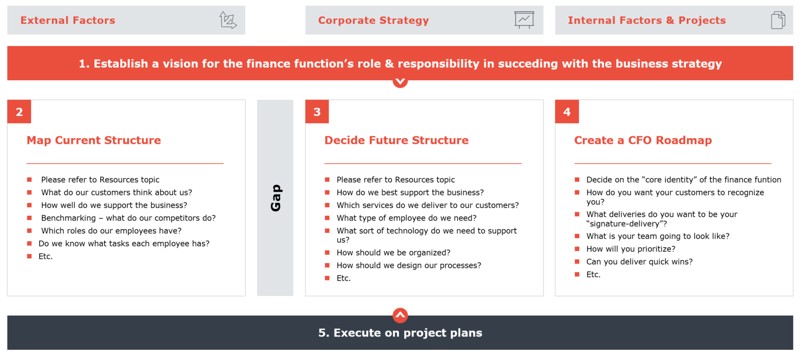The challenges are numerous for you as a newly appointed CFO
The areas a newly appointed CFO should focus on undoubtedly vary from company to company. If as CFO you take over a finance function where quality is lacking, the department is falling apart, and management reporting is not being performed correctly and on time, etc., you have no choice but to implement a series of short-term improvements that provide the necessary overview. In another company, the task you face may be of a more strategic nature and require your presence and engagement in the management team. The tasks can thus be both strategic and operational in nature – but both require focus.
This is further complicated by a third dimension: namely, external changes that are beyond your control as CFO. Where the focus in stable periods is on growth and earnings, when changes hit, the focus shifts to liquidity, the composition of capital structure, asset valuation, streamlining operations, in some cases restructuring etc. Perhaps this is not applicable to all industries, but certainly to a range of B2C industries.
As a CFO in a new position, you naturally want to establish your foundation in the company as quickly as possible, so it is important for you to find the balance in tasks that provides the most value for the company. At the same time, you need to position yourself as a key player. It is crucial that the tasks and approach to understanding the company are structured and prioritised optimally.
The expectations are sky-high
Both the CEO and other stakeholders expect that you as CFO very quickly gain business understanding and become an active part of the management team, thereby contributing to the company's performance by challenging established strategies, routines and methods. At the same time, the CEO also expects the finance function to have the competencies to deliver services of the right quality at the agreed time.
Which main areas should the CFO review?
It is our experience that you should prioritise your time within the first critical 100 days to create a solid foundation as CFO. It is in both your and the company's interest that you as CFO become operational and understand the company's DNA as quickly as possible.
What are the 'value drivers' that drive the company?
An understanding of the company's 'value drivers' is necessary to gain insight into how the company makes money, as well as its competitive advantages, cost and price structure, customer segments etc. In reviewing the company's 'value drivers', you as CFO should also consider opportunities to improve these 'value drivers', i.e. sources of additional growth, operational improvements and changes to the business model – and consequently the business implications – particularly focusing on the 'drivers' that you in your role as CFO can advantageously influence.
How does the outside world view the company?
Another way to understand the company is to view it from an investor's perspective: How the capital market would, for example, value the significance of an increase in turnover versus a smaller profit – or how the capital market would react to outsourcing production etc.
What is the finance function's role in relation to other functions?
Understanding other functions' tasks and daily operations is an important element in this process. A constructive dialogue will uncover other functions' challenges and issues, thereby giving you a more nuanced picture of the entire company – and not least help build relationships. Here there is also an opportunity to discuss the finance function's role and its ability to deliver the expected service. These high-level input/output analyses help you understand what you need to deliver going forward to the other functions in the company – and not least, what they need to deliver to you and the finance function.
Does the company's culture support the strategy?
The company's DNA consists of many elements, including culture. What kind of culture prevails in the company? Through communication with the company's customers and suppliers, an understanding will be created of how the company acts in different situations. Has a culture been created that lives up to the company's strategy regarding responsibility, commitment, quality etc.?
Your tasks as CFO are numerous and extremely complex during the first 100 days. And they all have high priority and are expected to be solved in an efficient and value-creating way.
What challenges do the CFO face?
The finance function is at the core of the CFO's area of operation. Credibility is the overriding keyword for your success and a well-functioning finance function. It is our experience that many new CFOs find that inadequate IT systems, manual processes, lack of competent finance professionals and poor organisation of the finance function and its tasks can be obstacles. An obstacle that becomes difficult to overcome if you as CFO are not entirely clear on your own vision for the finance function and do not have sufficient insight into its current DNA.
Therefore, it is crucial that you as CFO – based on the above issues – create a vision (to-be) for the finance function. The first task is to analyse the finance function's current 'state' (as-is) to map out, for example, which processes, competencies and systems are missing for you to succeed in implementing the vision. For instance, it will not be possible to fulfil a vision of reducing reporting time from ten to three days without making the necessary organisational and systemic changes. Subsequently, you should develop a plan for the finance function's transformation, where execution of the plan becomes crucial for successfully achieving the vision.
Depending on the state of the finance function, there will be work that requires your attention and time.
We often find that many do not see this task of transforming the finance function as their first priority. Rather, they see it as a task that can be solved along the way and is driven more by chance or sporadic focus than by an overall and prioritised plan. Initially, you can advantageously focus on understanding the company's strategy, culture, 'value drivers', business model and the organisation as a whole, which is important for understanding the finance function's condition and potential. Afterwards, you as CFO should develop your roadmap for the coming years' focus and development.
What is the dilemma during the first 100 days?
The prioritisation of tasks should depend on the company's general condition. If the company is under pressure, such as from unforeseen changes, it requires the combined competencies of the management team to develop the necessary plans for turnaround etc. Here, it is required that you as CFO have mapped the company's DNA whilst simultaneously producing credible financial analyses and reports; that is, 100% focus from the CFO.
If, at the same time, the finance function neither has the right structure to support the current financial core processes and reporting requirements nor has mapped out how the finance function can support the company's strategy going forward, this is where problems arise for you as CFO.
As mentioned earlier, the picture is further complicated by the challenges created by external changes. The CFO's competencies and experience may have been acquired in a time where the focus was on increased growth, earnings and margin optimisation; where classic finance disciplines such as focus on balance sheet items, including a realistic assessment of assets, optimisation of cash flow, working capital and a greater degree of focus on operational issues are absolutely necessary during a turnaround.
There are no easy solutions to this dilemma. In theory, all tasks should be solved within 100 days. In practice, this is probably not possible.
How can you solve the lack of time and resources?
You as CFO and the finance function can spend more hours on tasks, which in the long run will drain the finance function of resources with a high risk of losing core resources. In the long term, more resources can be added to the department, but it takes time before momentum is created. The possibilities are many, but not all are equally good.
When you as CFO start a new job, there is a unique opportunity to review the finance function's tasks and the potential for changes, because you are not influenced by history and current practices, but look at the finance function with fresh eyes.
Create your 100-day plan with the help of Basico Roadmap
Based on Basico's CFO Roadmap and your own CFO experience, we help you develop the right journey plan towards the vision set for the finance function.

The CFO Roadmap, illustrated in the above model, is a framework designed to support the processes for transforming the finance function. A framework which, based on the company's strategy and the immediate market conditions, maps the current structure in the finance function, uncovers improvement potential and defines and decides the future structure and its implementation.
In collaboration with you as CFO and the finance function, we help create structure and overview of the immediate fires as well as the development task that you can prioritise with both in mind – i.e., both the short-term necessities and the long-term expectations. Afterwards, it will be possible to chart the new way forward.
We have helped CFOs with this at both TORM and Danica Pension. Here, in addition to the Basico CFO Roadmap, we have used Basico Change Model, a framework tool to ensure the subsequent embedding of change in the finance function through concrete activities.

Do you need guidance on your 100-day plan?
We help implement and embed organisational changes and optimisations in the finance function. From identifying both the CFO's and the company's goals and ambitions for the finance area to clarifying the challenges that prevent them from being fulfilled.

 en
en
 da
da
